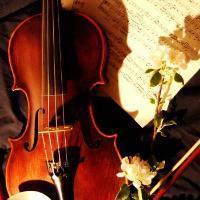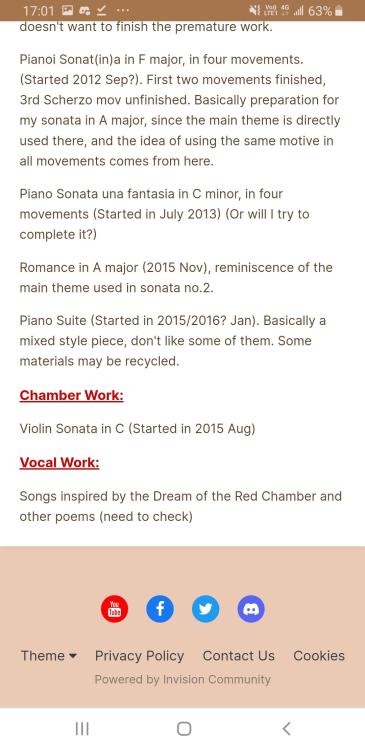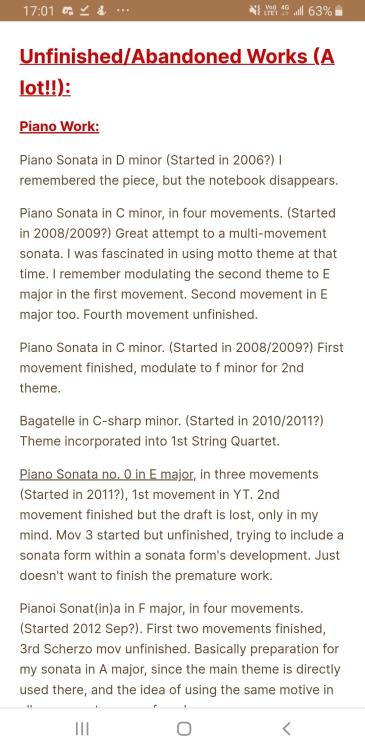Leaderboard
Popular Content
Showing content with the highest reputation on 07/29/2023 in all areas
-
Sorry, I am expanding my opinion, which I could not before. I couldn't agree more. Possibly, the one who learns in a regulated system, with teachers, etc...., is not so prone to fall into that error. What I did, at the beginning, while I was learning harmony (all tonal and classical, and then I started to move on to contemporary systems) is to compose either for a solo instrument or for the piano. Even then, it took me years to start writing for piano idiomatically. That is, to write things that were real (playable), and that sounded like real piano, not a continuous mashup of block chords or arpeggios or whatever. At that time I started to study counterpoint, for which I took an official course as a starting point and it helped me a lot. Little by little I was writing things for piano and another instrument, or two. With string quartets I haven't dared yet. Because whenever I use instruments I always study how they work, their ranges and what they can do. But it's not the same in an orchestra as it is as soloists. And so I started to study orchestration and did my first things with small orchestras first and then bigger ones. And I'm still learning, of course. I also see a lot of people who upload large-scale works without mastering the basics. It's not a matter of putting things up and filling them out.... The very process of learning little by little is fantastic.2 points
-
Tēnā koe, A few comments and criticisms; Some of the articulation you've written is simply not playable on the violin, especially the big old slur in bar 26, piece one. This is a common mistakes with pianists starting to write for violin, so dont feel bad about yourself. I'd just get rid of that slur as it has no use and is unplayable. Also, some of the chords you've written are impossible to play such as the bare-fifth G major in Bar 7 of piece one. You should chnage that top G to a B on the A-string to both complete the triad, and make it playable. You're melodic ideas are good, but your pieces seem to lack form. There nothing else really to say. Keep writing music and keep improving. Nga Mihi, Arjuna2 points
-
The story goes that Mozart was visited by a prospective student one day, who told the Master, "I want you to teach me how to write a symphony." Mozart said, "I think it would be best if we start with something simpler first, like Minuets." Indignant, the student retorted "But you were writing symphonies when you were 8 years old!" Mozart calmly replied, "Yes...but I didn't have to ask how." The moral of the story is: do yourself a favour, and start small, especially if you're teaching yourself. I have been a member of YC for many years, and I have far too often seen young composers here with either little or no experience composing, trying to write symphonies, piano concertos, full string quartets, etc., things far too ambitious for their level. This is a waste of effort, more often than not. Start smaller, and build a foundation of experience upon which to build bigger things when you're really ready. Happy composing!1 point
-
Thank you for the compliments! I was inspired by the simplicity of menuets such as BWV Anhang 132. Yes, I agree that 1:1 counterpoint is difficult to compose despite looking simple. This is largely due to the fact that each part still needs to stand on its own melodically while still making sense harmonically when played together. When composing second or third, etc. species counterpoint, it becomes much easier to create melodic independence between parts. With 1:1 counterpoint, it takes more effort to make each melodic line distinct enough such that the listener is able to hear two separate melodies at once. Like you said, with 1:1 counterpoint, it's easy to fall into composing too many parallel notes which ultimately make the melodies lose independence (thus defeating the purpose of counterpoint). Thanks again for complimenting the piece.1 point
-
God, doesn't this seem fun! I've only given it a brief once-over, but even then I find it hard to keep up: such a massive and utterly impressive score! And here I am finding it hard to write for a symphony orchestra 😭 The piece itself is also no laughing matter, with plenty of highlights to pick and select: there's that amazing schmooze-y texture around the 6-minute mark; then there's this glorious, percussive drive that reminds me a great deal of Gershwin's Rhapsody in Blue, paired with this loud, unencumbered orchestral-jazziness that reminded me of Duke Ellington's Three Black Kings; not to mention an impressive understanding of all kinds of musical timbres (not to mention the bajillion percussion instruments, like damn) that all sort of melt together into something of outstanding cohesion and uniqueness. Your confidence in writing shows not just in the scale of the ensemble you're writing for, but also in how well everything just, well, works. In terms of sheer scale alone, this has got to be the most impressive thing I've seen on this forum by far. As for critiques, I really can't give you much advice on what to change. It's not as if you're writing anything classical and heavily dependent on structure or anything: this brainchild of yours is jazz through and through, and the free form certainly suits it. Besides, when it comes to orchestral music, it's obvious that I am clearly no match for you. I don't really know where exactly your past productions would have made you unhappy (I haven't listened to them), but this has got to have made up for that in some way or another! I think you've done a fantastic job here. I'm truly looking forward to (and frightened of 😉) your finished product. I wish you all the best and good luck!1 point
-
I have done both - revision and abandonment. Most of my music written when I was young I have left alone, finished or not, regardless of their state of proficiency, because I consider it juvenilia and a record of who I was as a composer at that time. More recent works I'm more liable to revise as I learn or get better ideas. In any case, I don't regret anything I've done, except when I wasted time on things I wasn't ready for, such as a Mass setting when I was 12, and an opera at 13...both disastrous failures. I was definitely not ready, and I figured it out the hard way. I never made the mistake again, staying small and relatively simple all the way through high school and into adulthood. But even in my early 20s I was learning and making awful mistakes. I look back at my 1st symphony now, which was even performed, and I shake my head. It's terrible...good ideas, but very carelessly handled...the result of being a complete autodidact in composition. I heard once a saying that "he who always insists on teaching himself has a fool for a master," and I can definitely see the truth in that. But I had no one to teach me, and I wasn't about to sit on my hands waiting for someone to come along, so I did my best on my own. I don't regret a note of it, even if a lot of it is bad.1 point
-
1 point
-
Dear Henry.... @Henry Ng Tsz Kiu No regrets either, because we learn from all that. The truth is that, regarding previous works, or unfinished, there are two ways. One is to go back and try to revise and improve. The other is to always look forward, that is, not to review previous things but to start new things from scratch. I identify myself with this second assumption. That is why when I am sometimes asked in the comments if "are you planning to develop the work? Because I prefer to start another and incorporate what I have learned. I also think that you have to know how to separate the exercises (which you have to do hundreds of them) from the compositions that you plan. Anyway, there is no single method. But, of course, you can't start the house from the roof.1 point
-
This is a great topic. I agree with both of you that we have to make sure our basics are solid before going for bigger scale works. For practicing the basics there's no better way to write musical pieces and really use them in real life music, and it will be easier to utilize them in a smaller scale work, after you get familiar with them by listening and exercising. It's not that you cannot try to write larger scale works, but you will have additional aspects to consider: for orchestral pieces you will have to learn orchestraton alongside basic harmony, counterpoint and voice leading, while in a multi movement works you have to get with the form and structure and planning, and all these can deviate your practice on harmony and counterpoint. I myself took a different route: as I began composing with focus on form and structure first rather than harmony and voice leading. I was way too ambitious then to write multi movement works. Without the basic ability for them, it results in a lot of unfinished/abandoned works for me: But I think I have one thing on track: all my failure are piano works, so there's less time wasted on them (not necessarily wasted though). I myself think that you have to write good solo piece to write good chamber, and good chamber piece for good orchrstral piece. I am now in the period of chamber music and I will definitely try orchestral music later. Henry1 point







